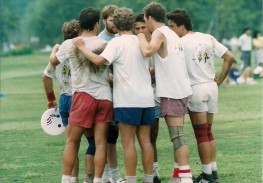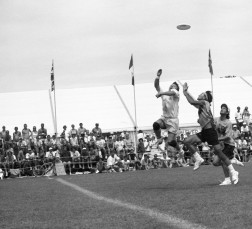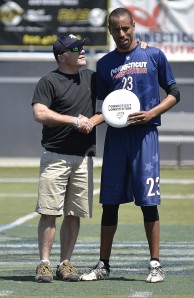I have been given the opportunity to respond to Ben Van Heuvelen’s recent article, perhaps because I was referenced several times therein, or perhaps because the editor assumed that I might see things a bit differently. If so, he was right. I do.
I didn’t come to love ultimate over a plate of lasagna, surrounded by like-minded peers in a high school cafeteria where the warmth of welcome flowed thicker than Bolognese sauce. I came to love it one hot summer night under the lights on a glass-strewn patch of clay under the Queensboro Bridge in Manhattan. I had just graduated high school, and my older brother had brought me along to try out for the local club team on two conditions: that I don’t embarrass him, and that I catch everything he threw me. Watching warm-ups I was pretty sure the first was out of the question. I wasn’t the youngest player out there, but I was easily the worst. And it wasn’t close. I watched a group of players from Bronx Science, including Jeremy Seeger (HOF 2010), throw crisp pass after crisp pass, every one right on target, and I was too nervous to even attempt to warm up my waffling, potato chip throws. I watched some of the best NY club players of the day, Mauricio Matiz, Jerry McManus, and Ken Gary do the same, and my sense of impending doom only worsened. But once I got on the field, it was a different story.
Offense back then was a largely disorganized mess of competing cuts, so it was easy for me to stay out of the way until my brother caught a pass. At that point, I ran to the end zone, he threw it, and I caught it. Every time. Hammers, backhands, and flicks. Long, floating bombs and sharp, cross-field blades. I ran them down if I could, but laid out if I couldn’t – glass be damned. Finally, the captain of the team, Derek Lent, came over and said, “Look, you made the team. Just stop diving on this shit before you get hurt.” They were the only words anybody other than my brother said to me all night.

An US All-Star team huddles in Japan. From left: Kenny Dobyns, unknown, Pat King, Mark Orders, Stevie Corlane, Mike O’Dowd, Kevin Cox. (Photo courtesy of Kevin Cox. By Masa Honda)
The tryout ended when two cars collided on the bridge above, sending a shower of broken glass down onto the field. We were fine with running and diving on it, but we drew the line at having it rain on us from above. After that we headed to the Blue & Gold Deli on First Avenue to sit on milk crates and drink Bud tall boys. If any televisions were being wheeled by, they had been stolen.
The point here is not that my experience was different from Ben’s (although it was). The point is that everybody’s experience is different from Ben’s, and that’s just how it should be.
I caught the rough draft, oral version of Ben’s article at UCPC 2013 in Newton, MA, and it made me uneasy. Now he has had the chance to sharpen his ideas and clarify his points in written form, and they have been published right here at Skyd. The comment boards and social media have been aflutter, and most of what I have seen is positive. I, on the other hand, am even more uneasy than I was before.
There is no doubt that Ben is an excellent writer, and many have already alluded to his eloquence. Clearly the preponderance of comments expressed so far and the ovation the oral version received at UCPC suggest widespread support in the ultimate community for Ben’s point of view. Given the subject matter and the audience, I shouldn’t be surprised to find so many people in agreement, but I am not one of them.
Like Ben, I was a varsity athlete in high school, but unlike Ben I had no problem with the culture of jocks at my school. At various times I played soccer, football, baseball, and I wrestled. The teams I played on played hard, our coaches preached sportsmanship and fair play, and the other teams didn’t suck. In fact, reading this portion of Ben’s article, seeing him use his unpleasant experiences to generalize all high school athletics, I was quite troubled. I recently attended a USAU Coaching Certification clinic led by Ben, and we talked openly about the coach’s responsibility to establish the culture of the program right away. From my read, the culture Ben’s coaches established wasn’t very appealing, but that sounds like an indictment of the coaches, not the players or their respective sports.

Dobyns flys high versus Big Brother in the ’91 World Ultimate Club Championship. (Photo by Toby Green)
I came to ultimate not because I was trying to escape an oppressive culture of jocks and fake jocks imposing their egos (or feigning imposition of their egos) on their opponents. I came to ultimate because it was the coolest, fastest, most awesome game I had ever played. Even better, it was a game that seemed to have a place for everybody, including a short fat kid like me. It turned out that self-officiation and spirit of the game were part of the package, but they weren’t the draw; the game was the draw.
Ben holds a different viewpoint, stating that the game is only part of what makes ultimate great. The other part is the “ethos” which has grown around it, an ethos that he explains to some extent using the words of Howard Cosell.
I’m not sure that it minimizes Ben’s point in any way, but I feel compelled to point out that Cosell knew nothing about ultimate, nor did he care. A teammate of mine on KABOOM! was an overworked, underpaid assistant producer on his show, Sportsbeat, and that’s why the piece aired. Cosell never saw the game, didn’t write the copy, and probably didn’t even bother to watch the clip. What amazed him was that anyone who had the opportunity to work on his show would take weekends off and spend his own money to play a game with a Frisbee that nobody cared about. But my teammate’s father was a well-placed executive at ABC, and Cosell knew whose palm to grease.
Another viewpoint Ben holds that I can’t agree with can be found in his statement that he can draw a straight line from the vision of the game’s founders right up to his joy in discovering the game at Amherst. Any student of ultimate knows that the first version of the rules didn’t include any reference to spirit of the game although it did include a provision for referees. The spirit clause wasn’t inserted for another ten years. One could argue that a straight line drawn from the vision of the founders would actually land closer to the AUDL or MLU than it would the Amherst Regional High School cafeteria. And since ultimate was played for ten years before spirit of the game was codified, one has every right to question Ben’s suggestion that ultimate couldn’t function without it.
This brings me to my most fundamental misgiving with Ben’s article, pronoun abuse. When Ben writes in the first person singular, elucidating his passion and vision for the game, I read with delight, even when I don’t agree with him. Ben has a goal for our sport. It is the joy of competition. That’s a worthy goal, and, despite Ben’s insistence that ultimate is different from all other sports, it sounds like the kind of thing any athlete passionate about a particular sport might say. But several paragraphs later Ben drifts into the first person plural, cautioning that we cannot change our goals. When did he become we? When did his goal become my goal (or anybody else’s for that matter)? The fact that many people agree with him doesn’t justify Ben’s use of the first person plural. His goal is his goal, but it is not our goal, nor is it inherently better or worse than anybody else’s goal. Yet his article is rife with the implicit assumption of precisely that – his goal is our goal and is a better goal than that of the AUDL, MLU, and the people who participate in those organizations.
Many years ago, I responded to an rsd thread in which someone suggested that people who want observers or violate spirit should be banned from ultimate (or perhaps something along those lines but less extreme). Maybe somebody with more time can find the thread, but my basic point was that if the founders had never written the rules and published them they could deny participation to anyone they wanted for as long as they wanted. But once they wrote the rules, had them published and distributed them, they forfeited that right. Once they put the game out there, it belonged to everyone, including the observer-wanters and the spirit-violators. As I said at the time, I like to think the founders believed in inclusivity as opposed to exclusivity, but unlike Ben, I make no claim to be able to see their vision. Nonetheless, I am all for inclusivity, and I still believe that the best thing about ultimate is that it has a place for everybody.
That’s the problem with “we” talk. By definition, once you classify yourself and everybody who thinks the way you do as “we,” you make everybody else “them,” no matter what they think. Another discussion from the recent coaching certification class that Ben moderated focused on barriers to getting players hooked on ultimate, and participants noted that the sport is kind of cultish, and that can turn newcomers off. I would argue that it is precisely this kind of “we” attitude about our sport that is the lifeblood of ultimate’s cultish culture, and it is definitely a turn off, even to people who are already hooked on the sport. When “we” talk becomes a clarion call to collectively rise up in defense of “our” vision of the sport because “this is not us,” it’s worse than cultish. It’s ugly. I know Ben well enough to know that isn’t how he meant it, but that’s how it came across to me.

Ken Dobyns shakes hands with the Connecticut Constitution’s John Korber at the inagural AUDL game. (Photo by David Sieling – PH Photography)
I respect Ben’s passionate commitment to the game he loves, but I think it’s worth pointing out that the very game he is so passionate about defending would appear to many players who came before him to be exactly the kind of conformist, sell-out version of ultimate that he decries the MLU and AUDL versions as being. Numbered jerseys with matching shorts, highly regimented warm-ups, official vetting of team names – all of these would have been anathema to the people who taught me to play, but here they are nonetheless. And despite the prognostications of ultimate doom that accompanied the advent of the Cuervo series and its two point line, the game survives to this day. And notwithstanding the dual threat of the unchecked rise of the oceans or a rogue, earth-bound asteroid, I expect ultimate will survive far longer than Ben or I will, regardless of who anybody chooses to like or not like on facebook.
As for my take on the professional leagues, here’s what I can tell you, Ben. I support innovation and experimentation, and though you have characterized these leagues as less than innovative given their poverty of imagination, I still consider them worthy experiments and I will support them. Of course, they will need more than that to survive, but I expect they already know that.
Finally, when it comes to my longstanding habit of speaking my mind without regard for the opinions of others, and how your friends’ Youtube interviews compare to my over-the-top on-screen moments, it’s an inherently unfair comparison. I say this not because their quasi-professional status forces them to spout inanities and clichés into the camera as a condition of their employment, but because they are, in all likelihood, simply not so clever as I am. Still, clever as I might be, I pale in comparison to my teammate and good friend Pat King who, when asked to describe the best thing about ultimate, stated simply, “that I play.” Ultimate will be in the Olympics and professional games will be being broadcast live long before anybody comes up with a better line that that one. That’s not their fault. That’s just the way it is.
Feature photo: “The Blocks That Saved America” after beating Sweden in a come-from-behind victory at Worlds 88 in Leuven Belguim. Feature photo courtesy of David Mathison by Dr. King.





Comments Policy: At Skyd, we value all legitimate contributions to the discussion of ultimate. However, please ensure your input is respectful. Hateful, slanderous, or disrespectful comments will be deleted. For grammatical, factual, and typographic errors, instead of leaving a comment, please e-mail our editors directly at editors [at] skydmagazine.com.